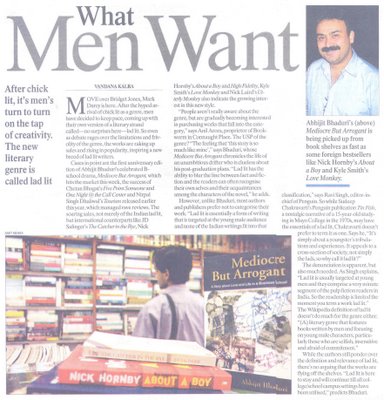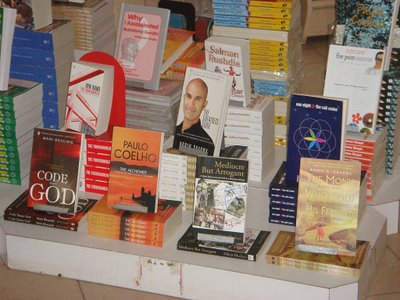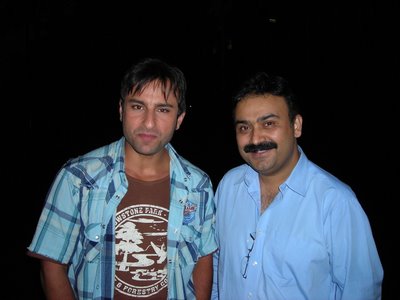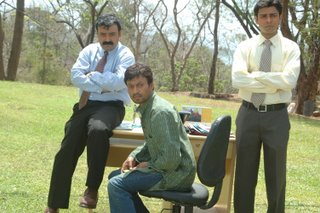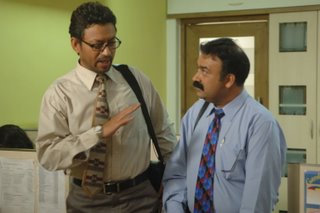Book Review
ADOI FEBRUARY 2006 - MALAYSIAIn 1999 he moved to a Regional role in the Asia Pacific Shared Services Organization for Colgate and was based out of Kuala Lumpur before moving on to a global role in New York at the Corporate Headquarters for Colgate-Palmolive. Abhijit Bhaduri has joined FritoLay - the Snacks division of Pepsico International as head of Human Resources for the BU.
ABHIJIT graduated from Shriram College of Commerce, Delhi University in Economics and then went on to do his MBA in Personnel Management & Industrial Relations from XLRI, Jamshedpur and also has a LLB degree from Delhi University.
Abhijit’s career spans two decades across diverse industries and multiple countries. He worked for companies like Eicher Goodearth, Shalimar Paints, Tata Steel and Mudra Communications and in 1997 he joined Colgate Palmolive in Mumbai. In 1999 he moved to a Regional role in the Asia Pacific Shared Services Organization for Colgate and was based out of Kuala Lumpur before moving on to a global role in New York at the Corporate Headquarters for Colgate-Palmolive. Abhijit Bhaduri has joined FritoLay - the Snacks division of Pepsico International as head of Human Resources for the BU. Abhijit brings with him varied experiences across industries, locations and geographies and has worked with diverse cultures and has led multiple global projects with cross-functional teams.
He has also recently authored “Mediocre But Arrogant”, a fictional novel about life in a Business School in Jamshedpur. The book has been on several bestseller lists in India and US and finds mention in the online encyclopedia as an example of a contemporary Indian fiction writer. He has been a popular radio voice in India and abroad and hosted a popular radio show in US on Indian movies and film music.
Abhijit is married to Nandini and has a daughter Eshna and son Abhishek.
do not know why I landed in this corporate jungle. Why I chose to do Human Resources Development. Why I did not decide to stop playing a game which I neither understood nor had any desire to learn. In fact, I did not even start off being in Human Resources.When I joined MIJ (Management Institute of Jamshedpur, Bihar) in the summer of 1982, the course I had enrolled for was actually called Industrial Relations and Social Welfare. At that time, there were only Welfare Officers. But that term really sucked. So some smart cookie who thought like Rascal Rusty, must have decided to “Tweak the formula, change the packaging and make a new commercial with a cute babe in a skimpier bikini,” as the Marketing guys did with all their soaps and toothpaste brands every year, and called it a relaunch. It was a new and improved version of the Personnel Management & Industrial Relations course (which sounded so Neanderthal) and called Human Resources instead. And those who graduated from the institute were re-christened “HR professionals” instead of Personnel Managers.
ABHIJIT BHADURI
After struggling through two years in MIJ I was let loose on the Corporate Sector. In course of time, I was anointed head honcho of HR of a reputed firm. All because of the stamp that MIJ put on me. Rather, because as they say in management jargon, I bore the MIJ “brand.” It was indeed all about Brands. How else would you explain the transformation of scores of university graduates into much sought after brands in the corporate bazaar? Given the number of applicants every year, it seemed as if the branding machine at MIJ worked overtime!
In 1982, all the buildings of MIJ were rather, umm ... utilitarian, and therefore did not have that certain style that is necessary to be taken seriously by the world at large. The way you dress creates the first impression on those who hold the keys to all the goodies in life. Rascal Rusty would advise everyone to “always look the part.” MIJ certainly did not look like it met people’s expectations of what a major Business School should look like. Nor did it have the necessary spark that makes a major brand.
The Boys Hostel in the neighbouring block reminded me of the army barracks built to keep everyone alert and on their toes.
“If you do not feel comfortable and relaxed you will learn to be a fighter. Luxury will dull your desire to excel.”
That was what my father said every time I desired but was denied something that was even remotely classified as a luxury. MIJ operated on the same philosophy.
The Chapel in the Administrative Block was an integral part of MIJ. If you spoke to Father Hathaway, a Scottish priest and one of the original Magnificent Seven who built MIJ literally, brick by brick, this is what he would tell you:
“I came to India with six other priests, in 1945, with a common dream. Two years later, MIJ was started in a small room of the Hotel Bistupur in Bistupur market of Jamshedpur. Those early years were a challenge. Within three months of coming here, one of my colleagues died of malaria. But we were not disheartened. I am so happy we did not go back leaving this beautiful city. We knew a free country like India would have a great need for trained managers. In those days most industries like the Steel and Iron Company (SICO) were labour intensive. So there would always be a demand for Personnel Officers. The first batch of MIJ had only six students. Over the years, the foresight and hard work of the teachers and students has paid rich dividends and the present campus is testimony to the esteem in which the Corporate Sector holds MIJ. The Chapel was built by us when we started this institute. We needed to get God to sign up for this project of making MIJ India’s best institute for learning management! Theek bola?”
He used to lapse into his heavily accented Hindi or Bengali or Tamil or Oriya depending on who he was talking to.
Affectionately called Haathi he was one of the most popular figures in that region. He knew virtually everyone in Jamshedpur – from the CEO to the fruit vendor in Bistupur, and he addressed them all by name. Father Hathaway remembered every student who had passed through the portals of MIJ. How did he do it? None of us dared to hazard a guess. He was not only one of the best loved teachers, he was guide, architect and visionary all rolled into one.
In deference to the regard he was held in, MIJ-ites down the generations have had great respect for everything Scottish – especially Scotch. The girls in MIJ swore he looked like Gregory Peck. Haathi invariably brushed off the comparison with, “I must see a movie of this chap who claims to look like me …” At age sixty-five, Haathi rode a Royal Enfield motorcycle as if he were on a Grand Prix race track. Anyone who hitched a ride with him to Bistupur swore never to repeat the mistake. Haathi weaved through the traffic, chatting nonstop with the pillion rider even as he waved furiously at acquaintances and shouted greetings at friends as he careened along, much to the horror of his passenger. He still played basketball with us every evening and gave the students an inferiority complex with his accurate baskets.
Because of Father Hathaway’s charismatic personality, fund raising campaigns for MIJ always exceeded their target and he was able to finance his dreams of improving MIJ’s infrastructure. At every Alumni meet that I have attended over the years, the conversation would inevitably veer around to Haathi. Everyone professed only undiluted admiration and respect for him, including the students who had received lousy grades in his classes. Father Hathaway was a tough act to follow, for all his successors.
The original building of Hotel Bistupur, where MIJ first started off, now houses a popular Bar. That’s why, according to Boys’ Hostel folklore, every MIJ-ite is “bar-coded” and hence destined to be a confirmed boozer. “Win or lose, we must booze” was the unofficial motto especially when we played our football matches on Saturday evenings against the local Engineering college – and usually lost. MIJ’s official motto, “Enter to learn, go forth to serve” was modified to read, “Learn to enter; Go forth to serve” on the bathroom walls of the Boys’ Hostel. It reflected our point of view and desires more accurately than the official motto ever would.
Our batch of ’82 had eight girls and forty guys. This ratio made life look grim to us as each one of us did a quick mental calculation of the probability of success as we looked up the names of girls who would be our classmates for two years from the list of Juniors. Our Senior batch was worse off. They had only one girl in their batch who was the fantasy of forty-four depraved young men. To them, our batch with the presence of eight “babes” made a huge improvement to their Quality of Life Index. So we got no sympathy from them when we cribbed about the adverse ratio of boys to girls.
So were a lot of other things in life, I realized for almost the first time when we started applying for summer trainee assignments. I was very impressed when I heard the statement at a Pre Placement Talk (PPT in MIJ lingo), for the first time: “We offer a career and not a job.” All companies declared that they were looking for leadership qualities, motivation, dynamism and excellent communication skills. They all wanted someone who liked to work in a fast paced environment and loved challenge. When asked what the promotions and increments were based on, every company had the same stock response.
“Ours is a meritocracy. At the end of the day all that matters is who got us results and who didn’t.”
So when I attended an interview in our campus for a summer trainee assignment with a company that makes a very popular brand of cough syrups, I was determined to impress, and I was sure that honesty was still the best policy. Their Director, Personnel, asked me why I chose HR as my specialization in MIJ instead of Marketing since that was the glamorous option. I could have lied through my teeth and said something untruthful like:
“Right from my student days, Sir, I noticed that the one factor that makes or breaks a company is the quality of the people it has. Every organization can buy the same machines that its competitor has. Every product can be copied but what cannot be duplicated is the collective set of skills that its employees possess. It is the business of the Personnel department to ensure that every employee uses his potential skills for the benefit of the organization and help it transform itself from being ordinary to exceptional ...” etc.
But stupid me, I decided to tell the truth.
“I do not know Sir. Getting into MIJ and this course on Personnel Management was all just one big act of serendipity.” I did not get selected for the job. The bonehead who was interviewing me didn’t care to know the Truth. All that he had said at the PPT, about looking for a person who would take over from him in five years flat, must have been just that – all talk.
I was upset and angry. Was I not selected because I had been honest in my responses? Must be. It was so unfair! I decided that I would boycott that brand of cough syrup for the next two months even if I sounded like a foghorn. I also went around telling people to avoid that particular brand because it contained harmful drugs. My very own smear campaign against the mighty corporation. It was my way of saying, “That’s what you get when you fool around with a loyal customer … even if he wants to apply for a job.”
Noticing my rather peevish behaviour, my friend Rusty said to me one day, “Abbey, who on earth asked you to use that word ‘serendipity’ in an interview? And what does it mean anyway?”
“Serendipity is the trick of making fortunate discoveries accidentally,” I replied innocently.
“I know what serendipity means, Abbey. But I bet the guy who was interviewing you didn’t. That is why he didn’t select you. Nobody likes a smart aleck in the workplace. They make difficult subordinates who are likely to overshadow and expose the ignorance of their bosses. So no manager will ever employ anyone smarter than himself, assuming, of course, that you are smarter than him.”
I ignored the sarcasm. “But Rusty, this guy declared in the PPT that he was looking for a subordinate who could take over from him in five years so that he could retire and spend time doing social work. He said he was looking for somebody who would be better than him in all respects.”
“You are such an ass, Abbey, you will believe anything. The PPT is a courting process when you want to entice the applicants. So it cannot be the time for honesty. Both parties, Companies and students, garnish the truth. Only after the appointment letter is received and accepted, will the employers reveal their true colours. By that time it’s too late. You understand? What that fellow was trying to do is get enough suckers to apply for the job so that he could take back the stack of Resumes and show his boss what a great job he had done at building the Company’s brand in MIJ. Then he will select the dumbest not the smartest candidate as his assistant. So that by sheer contrast he will appear a genius and indispensable to the company. Then he will continue to drop hints to his own boss about taking early retirement and also mention in the same breath how fresh and inexperienced the new recruit is. That will make his bosses paranoid about losing an experienced hand. They will give him a big raise and a generous bonus and then request him to delay his retirement plans for just a few months more till they manage to train that MBA they hired from campus.”
“But how do you know all this Rusty?” I interrupted. After all he too was a fresher like me.
“Forget it da, I’ll tell you some other time.”
How he knew did not matter. What did was that talking to him had lessened my embarrassment at not getting selected. I was easily convinced that it was because I was smarter than my potential boss. It was amazing, the number of guys I was smarter than!
It was not difficult to believe Rustom Topiwalla, Rusty for short. Though he was a bit of a pompous ass, it was generally agreed that he was the most Corporate-savvy person in our class. People called him “Rascal Rusty” behind his back, I didn’t know why. No one knew anything about him. He was an enigma. A loner, he generally avoided the Hostel crowd, and never joined us when we went out to eat Chinese at Franks. He was always dressed in a pair of jeans and a black shirt. I secretly admired his 3C appearance, his “Cool, Calm & Collected” manner.
Rusty was a teetotaller and made it sound like a virtue. When he was in his room he usually sucked on a pipe. There was rarely any tobacco in it because I do not remember seeing any smoke coming from it. He just liked to hold it as he scanned through business magazines looking scholarly and professional. He hardly ever spoke except to make very profound sounding statements every now and then. Unlike most of us in the Junior batch, Rusty spent much time in the Library, reading Annual Reports of Companies and The Economic Times. Then he would impress us by quoting from them. His knowledge of the world of management and of how corporations worked made even the Seniors ask him for advice, for a fee of course.
We found out that Rusty had a Bachelors degree from Loyola College in Madras. He had started his own company that marketed “education for busy executives”, and had already been a CEO – even if it was of his own start-up. He had been at the pinnacle of power for five years before succumbing to his “thirst for knowledge” and joined MIJ unlike most of us who were fresh off the Bachelors Degree assembly line. Rusty invariably came up with solutions to every problem and short cuts for every task. He had a fair number of acolytes who turned to him in a crisis. He helped anyone who asked him to, but extracted his pound of flesh from them.
Once Rusty sold me a list of references for the price of his haircut. Another time he offered to help me write out a term paper for Haathi in exchange for a month’s subscription to The Hindu. Paying for that newspaper subscription meant giving up smoking for a week.
“Practical experience, that’s what matters in life. Most of our Seniors only know what Kotler has said about Marketing. They have no clue how that translates to designing a Marketing Plan for the district of Shimoga. Whereas I know what works in the marketplace. Kotler is bound to agree with me.”
“Who is Kotler? How does he know about Shimoga?” Even I didn’t know who that was.
“The guru of marketing, Abbey,” Rusty said, barely able not to sound patronising. I flushed. But he went on, “Philip Kotler’s Marketing Management: Analysis, Planning, Implementation and Control is the most widely used marketing text book in B-schools worldwide. The guy has a Ph D from MIT in Economics, did post-doctoral work in Mathematics at Harvard, and in Behavioural Science at the University of Chicago.”
“Do you know him?”
“We are not best friends or anything like that. But yes our ideas have frequently struck a common chord. I have spoken about decision making and planning models in Marketing. As in life, in Marketing too, planning is everything.” “But yaar, in my experience, serendipity rather than careful planning has brought me here, to MIJ.”
I looked the question paper. Quantitative Techniques ie QT pronounced as ‘cutie’ was tough subject for all – even the engineers. Not clearing that would mean curtains for life. I stared at the crazy Prof’s handiwork and read with disbelief:
You walk into a watch shop and notice that most clocks show a time somewhere in the range of 5:50 to 6:00pm. Which statistical measure ie Mean, Median or Mode will give you the best estimate of the actual time. Why? And why would the other two measures be unsuitable?
What? My forehead creased in a hundred furrows.
Who came up with this shit? What was this man’s intention? What knowledge of QT will he measure by this absurd question? Who cares to use Statistics when you are in a watch shop? You simply buy the bloody watch and get the fuck out. And why would you care if different clocks in the shop showed different times.
I told myself that I would come back to this later, after I had completed the other questions. Wouldn’t you just calculate the mean of all the different times and come to the conclusion … wait … it must be the Median … oh I know … no ... OK MOVE TO THE NEXT QUESTION…
I moved to the next question. And the next. They were no better. The class had suddenly gone quiet.
Chatto announced the next morning in his strongly accented squeaky tone, “The parson who scored the least in my queez is Joyonto Ganguly. He scored 0.86 followed closely by Horpal Singh who got 1.38.”
Jayant Ganguly alias “Joy” and Harpal Singh alias “Hairy” led the funereal march. Only Mozart’s Requiem was missing to provide the soundtrack for this mourning. I got 2.73.
2.73 out of 10? What a nut case, giving marks in decimals. Couldn’t you have rounded them off, you weirdo?
The top of the heap was Sethu. He got 9.8. We were all awestruck by the fact that Sethu had got a near perfect score – 9.8 out of ten was great. We remained impressed by Sethu’s performance in the quiz until Chatto announced that the marks were out of 100.
Every MIJ nickname had a reason and story whether one knew it or not. These names became such common currency that one sometimes had to stop and think what the person’s real name was. There were several categories of pet names. The simplest ones were truncated versions of the original. Hence, David Chemmanoor became Chumma. Viswaranjan was Vishy. Alpana was Alps (guess why). Hathaway became Haathi.
When there were five Venkateswarans floating around between the Senior and Junior batches, the shortened version of the name had a prefix attached to it. So instead of demanding impatiently, “Which fucking Venkat are you talking about?” we referred to them as – Junior Venky Senior Venky, Mess Venky who was our Mess Secretary and Curly Venky because of his frizzy hairstyle. Only one guy had the honour of being addressed as plain and simple Venky.
I was picking up the lingo thanks to the coaching I received from a Senior, in MIJ – Posh. His name was Tapas Misra. Chatto kept on pronouncing it as Taposh Miss-row. Taposh was soon referred to as Posh in true MIJ tradition. I had been a willing customer for his old text books. He sold them to me at half the price. Once he got the money, he even threw in a bonus. He gave me a copy of the November 1979 issue of Penthouse and a bunch of Term Papers written by MIJ-ites over the years in different subjects.
“What would I want to do with this shit?” I asked Posh.
“The Penthouse is worth its weight in gold.”
“I know. I was referring to the Term Papers.”
“I got them from someone who was here five years back. You know what that means? You can use these as handy references especially when Beez gives you Term Papers to write. Just mix and match the stuff, change the sequence of the paragraphs but always add your own pictures and illustrations. Beez hates people cogging pictures. I don’t think he reads the shit we write anyway. I am a great believer in recycling knowledge.”
Dadu’s Dhaba was the venue of our drinking binges on weekends since drinking liquor was prohibited in our Hostel. He loved the boozing sessions and our WC-DMR (Pronounced WC-Dimmer and stood for Who Can Drink Most Rum) contests but hated our collective efforts at singing that happened during each such event. On these occasions, we would pool our resources and buy a few bottles of Old Monk Rum and pour it into a large drum that was permanently kept at Dadu’s. Dadu would be given the honour of declaring the bacchanalia open. He would collect his share of three mugs of rum all at once and then gulp them down in large eager swigs. Mug after plastic mug (a precautionary measure to prevent injuries from broken glasses!) would then be dipped into the drum and emptied thirstily. This would go on until the elbows became immobilized or the liquor ran out.
These booze sessions usually ended up with a bonfire and all of us, softened up by all that liquor, would sing our favourite Dylan songs. Bob Dylan was our hero. He wrote and said all what we wanted to. After the initial spell of drunken choral singing, we would hand over the stage to Arunesh for some professional grade music. That was the moment he loved and gloated over. If you wanted him to sing a specific song, you had to address him as Arunesh – never Ana or Annie and ask for it in a suitably reverential tone.
Everybody, without exception, agreed that Arunesh played the guitar as well as Dylan. There was a certain magic in those starlit nights as the moonlight shone on his black Yamaha acoustic guitar. He caressed each note off the nylon strings and shiny frets. He once wrote down the lyrics of “Blowing in the Wind” for us on the blackboard. We all memorized the words and thereafter we sang it like it was our own anthem.
“How many roads must a man walk down before you can call him a man?”
It was not sung like a drunken sailor’s song, but like a man’s plea for an answer. There was something in that song that made me pine for Delhi one helluva fucking lot more than what I was capable of handling emotionally. All that rum inside me did not help either. For some strange reason it reminded me of Priya and I missed her. I felt sorry for all the times I had hurt her with my stupid comments. Did that mean I loved her?NEVER!! She is not my kind. You know that, don’t you. I would stop talking to myself and would quickly get over the ache and concentrate on the rum and the music. Arunesh did not only depend on Dylan for songs. He was equally at home singing Kishore Kumar numbers complete with yodelling and all. We all thought he sang Simon and Garfunkel, Beatles and Cat Stevens just as well. Besides this sort of mainstream music, there were Rugby songs that were especially requested for during our all-male singing sessions. Our eternal favourite was Diana’s Song: Diana, Diana show me your legsDiana, Diana show me your legsDiana, Diana show me your legsA foot above your knee.Rich girl rides a limousinePoor girl rides a truckThe only ride that Diana getsIs when she is having a F…A few more glasses of rum and he would egg us on to greater heights, “Who wants to sing the German Soldiers’ song with me? It goes something like this:The German soldiers went to hell Parlez-vousThe German soldiers went to hell Parlez-vousThe German soldiers went to hell They screwed the Devil’s wife as well, Inky pinky parlez-vous.
Once Chumma had gotten technical, “Machan there’s a technical praablem in this saang. If they say parlez-vous, it hassz to be French soldiers, da and not German. I did French for eight months at the Alliance Française.”
A yell from the crowd followed by a volley of abuse that can only be politely summarized as, “Who cares?” but the exact words that were used … You don’t want to know, da.
This and several other songs had been handed down through generations of MIJ-ites. Often, the singing continued till the soft rays of the moonlight gave way to the orange hues in the eastern sky. Some of us would wake up to the sight of Gur going for his daily run while others would quickly get back to the Hostel, avoiding eye contact with Haathi who would be reading his Bible as he walked briskly along the cobbled pathway that led to the Boys’ Hostel.
Watching the sunset along the banks of Subarnarekha was a universal favourite. The sight would fill us up with wonder and amazement at the spectacle nature could paint for us. Sometimes the colours would be so vibrant that it would look unreal. If Arunesh joined in with his guitar and sang the soulful, “Kahin door jab din dhal jaye…” or “Woh shaam kuchh ajeeb thhii…” we would sit there mesmerized. The only challenge was to prevent some of the others, especially Chumma, from joining in and ruining the moment. Very often Chumma would get into an emotional knot then invariably Joy would discreetly remind him about a pending assignment. That would keep him silent and withdrawn until we returned to the hostel.
I thought Business Policy was all about making sense of oxymorons. Rusty’s favourite example of this figure of speech had to be “Military Intelligence” or maybe “Civil Engineer.”
“Ever seen one?” Rusty would ask as he cackled insanely.
As far as I was concerned, even “Business Policy” or “Strategic Planning” were oxymorons.
Rusty did not show the slightest interest in Alp’s assets. Instead he passed me a book called Lateral Thinking: Creativity Step by Step, by someone called Edward de Bono.
“The consultant was right, you know,” he said to me. “Linear thinking can produce limited results when the problem is undefined. I had once read about a great example of lateral thinking. You want to know what it was.”
Of course I did. Would save me the bother of reading it for myself. When you are used to being spoon-fed as we are in our education system, predigested mush is always welcome!
Rusty explained, “A hotel had a major problem. The guests constantly complained that the hotel lifts were too slow and they had to wait endlessly to be carried across floors. What would you suggest, Abbey, if they had called you in to solve this problem?”
“That’s a no-brainer. The speed of the lifts would have to be adjusted so that the frigging lifts move faster. The lift mechanic could have told them that,” I replied glibly.
“Now that is a classic example of linear thinking. You would never cut it as a consultant, Abbey. Listen to this. The consultant who was brought in suggested something truly amazing. He got the hotel to fix massive mirrors in the waiting area near the lifts. Within no time the complaints stopped. Why?”
I pondered over it for a moment. “Why would you want to fix mirrors near the lift? Some kind of optical illusion?”
“Hmmm … yes and no. But mainly no, da. The mirrors gave the hotel guests something to do while waiting for the lifts.”
“Yeah, I know that one. The mirrors let them make last minute surveys – check if hair was in place, and fly zipped up before stepping into the lift. Since they were occupied, they did not notice how slow the lifts were … Hmmm … Now it figures. That’s what Pari meant when he said we should look for the real problem and not the symptoms.” I suddenly felt enlightened.
The train was moving past the over bridge. I could see the familiar outline of the Steel factory. The Dalma range of mountains. I was leaving behind a slew of memories of my two years in MIJ that had changed my life. I thought of Haathi and remembered that I had his letter in my shirt pocket. What could he have written? I opened the letter and read it. It was short note that was written in Haathi’s unmistakable neat handwriting, each word carefully formed.
The Tatanagar Express was on its way to Delhi. Was it the crimson smoke from the chimneys of the Steel Plant that blurred my vision of the city skyline? Or was it the gathering tear …
http://www.adoimagazine.com/home/index.cfm?artid=355&level3=1&issuelist=193&listing=197
 at their keyboards, tapping into their own experiences to spin out slice-of-life stories that appeal to 'People Like Us'.
at their keyboards, tapping into their own experiences to spin out slice-of-life stories that appeal to 'People Like Us'. publisher.
publisher. Minneapolis, US. Certainly, the descriptions of the 'advertising meeting in the fourth floor conference' room and life in the 'northern region sales office' are the book's most entertaining, insightful bits.The central character, heavily inspired by Bridget Jones, is 29-year-old Minal Sharma - the archetypal MBA trying to 'have it all'. Says Kaushal: "In the Indian context, despite all the recent permissiveness one reads about, I feel women still agonise over marriage, career, family expectations and trying to make it all work out." Though reviews have been mixed, the light-n-bright read seems to have found enough takers. Penguin is going in for a second reprint just two months after its initial release.
Minneapolis, US. Certainly, the descriptions of the 'advertising meeting in the fourth floor conference' room and life in the 'northern region sales office' are the book's most entertaining, insightful bits.The central character, heavily inspired by Bridget Jones, is 29-year-old Minal Sharma - the archetypal MBA trying to 'have it all'. Says Kaushal: "In the Indian context, despite all the recent permissiveness one reads about, I feel women still agonise over marriage, career, family expectations and trying to make it all work out." Though reviews have been mixed, the light-n-bright read seems to have found enough takers. Penguin is going in for a second reprint just two months after its initial release.


